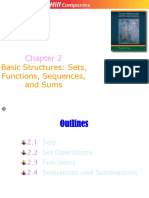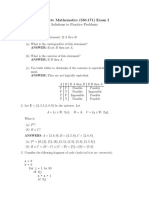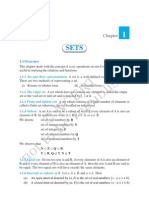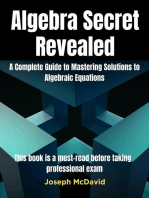hw2 UM101
hw2 UM101
Uploaded by
ice waterCopyright:
Available Formats
hw2 UM101
hw2 UM101
Uploaded by
ice waterOriginal Title
Copyright
Available Formats
Share this document
Did you find this document useful?
Is this content inappropriate?
Copyright:
Available Formats
hw2 UM101
hw2 UM101
Uploaded by
ice waterCopyright:
Available Formats
UM 101 : ANALYSIS & LINEAR ALGEBRA – I
“AUTUMN” 2020
HOMEWORK 2
Instructor: GAUTAM BHARALI Assigned: NOVEMBER 26, 2020
1. Let us consider a set A = { 0, 1, 2, 3, 4, 5, 6, 7 } on which we define two operations + and × as
follows:
a + b := c, a × b := d, (1)
where c and d are obtained as follows:
c = the remainder obtained when dividing (a + b) by 8,
d = the remainder obtained when dividing ab by 8.
(The operations between the unbarred variables a and b above are the usual addition and multipli-
cation between natural numbers.) Is (A, +, ×) a field? Justifiy your answer.
The next three problems are devoted to showing that many statements that we take for granted
about R require proofs based on R being an ordered field. While R has just been introduced, these
problems will rely on the first thing to be presented on November 27: i.e., that Apostol’s
treatment of R is one where its existence and well-definedness are taking to axiomatic. Hence, the
Axioms 1–9 in Apostol, Sections I-3.2 and I-3.4 for R are the properties (1)–(9) — presented in
class — of ordered fields.
2. (a part of Apostol, I-3.5, Prob. 1) Using only the field axioms and the order axioms for R, prove
the following:
Theorem. Let a, b, c ∈ R. If a < b and c < 0, then ac > bc.
3. (Apostol, I-3.5, Prob. 2) Using only the field axioms and the order axioms for R, show that
there is no real number x such that x2 + 1 = 0.
4. Let a, b ∈ R and assume that a > b. Show that there exists a real rumber c such that b < c < a.
Note. You may freely use without proof any of Theorems I.17–I.25 in Apostol, Section I-3.4,
without proof.
You might also like
- Problem Set #1. Due Sept. 9 2020.: MAE 501 - Fall 2020. Luc Deike, Anastasia Bizyaeva, Jiarong Wu September 2, 2020Document3 pagesProblem Set #1. Due Sept. 9 2020.: MAE 501 - Fall 2020. Luc Deike, Anastasia Bizyaeva, Jiarong Wu September 2, 2020Francisco SáenzNo ratings yet
- Conceptualprobs ch2Document4 pagesConceptualprobs ch2Muhamad Zahwan AnwarNo ratings yet
- Discrete Mathematics and Its Applications: Basic Structures: Sets, Functions, Sequences, and SumsDocument61 pagesDiscrete Mathematics and Its Applications: Basic Structures: Sets, Functions, Sequences, and SumsBijori khanNo ratings yet
- MATHS111CDocument3 pagesMATHS111CHARYANVI OPNo ratings yet
- Sets and Cardinality Notes For 620-111: C. F. Miller Semester 1, 2000Document21 pagesSets and Cardinality Notes For 620-111: C. F. Miller Semester 1, 2000DarKevin PerillaNo ratings yet
- The Set of Real NumbersDocument59 pagesThe Set of Real NumbersJChris EsguerraNo ratings yet
- Logic and Set Theory Assignment3Document1 pageLogic and Set Theory Assignment3yitzhak158No ratings yet
- hw1 UM101Document1 pagehw1 UM101ice waterNo ratings yet
- Ex_2Document2 pagesEx_2prokchorbazNo ratings yet
- Xi Class HHW 2024Document2 pagesXi Class HHW 2024kzyie24No ratings yet
- SinglevariableDocument51 pagesSinglevariablePascal PhilipNo ratings yet
- 1 discrete structureDocument26 pages1 discrete structurepremrajora90501No ratings yet
- Laws of MatricesDocument24 pagesLaws of MatricesRahul GhadseNo ratings yet
- CS 261 Homework I Solutions 2012Document7 pagesCS 261 Homework I Solutions 2012mandingomonstercokNo ratings yet
- XII - Second Unit Test - MATHSDocument2 pagesXII - Second Unit Test - MATHSrshobana78No ratings yet
- Discrete Mathematics (550.171) Exam I Solutions To Practice ProblemsDocument6 pagesDiscrete Mathematics (550.171) Exam I Solutions To Practice ProblemsAjamalNo ratings yet
- MMW Part 3Document16 pagesMMW Part 3Cabunag JeffNo ratings yet
- Grade XI - Maths - PA1-1Document4 pagesGrade XI - Maths - PA1-1diyanayak480No ratings yet
- Tutorial 01Document2 pagesTutorial 01Shannamae YangNo ratings yet
- FunctionswithoutpauseDocument127 pagesFunctionswithoutpauseyaredkidus879No ratings yet
- L-2 - Relations and LatticesDocument14 pagesL-2 - Relations and LatticesCustom 11No ratings yet
- Class12 CommereceDocument9 pagesClass12 Commereceaarnavp1427No ratings yet
- Lecture 1 Notes-SetsDocument9 pagesLecture 1 Notes-SetsWebby ZimbaNo ratings yet
- Lecture Notes 61cm 18 AnalysisDocument79 pagesLecture Notes 61cm 18 AnalysisAyush YadavNo ratings yet
- MATH LinearAlgebra HW1 - 094568Document2 pagesMATH LinearAlgebra HW1 - 094568Nam PhamNo ratings yet
- MATH 207, Honors Calculus III, Fall 2009 Exam I by Scott WilsonDocument6 pagesMATH 207, Honors Calculus III, Fall 2009 Exam I by Scott Wilsonranks231No ratings yet
- 11th Maths QP (01-06-2024)Document2 pages11th Maths QP (01-06-2024)bhandarinikita2011No ratings yet
- Vector Spaces: Theory and PracticeDocument23 pagesVector Spaces: Theory and PracticeSoumyajit BagchiNo ratings yet
- LECTURE-1Document17 pagesLECTURE-1meskeremw802No ratings yet
- مرجع انجليزي رياضيات متقطعه حلو♥Document69 pagesمرجع انجليزي رياضيات متقطعه حلو♥MohammedNo ratings yet
- Xii Maths Book-1 Based Self-Assessment Tests 2022-23 (Amit Bajaj)Document20 pagesXii Maths Book-1 Based Self-Assessment Tests 2022-23 (Amit Bajaj)Dheeraj SinhaNo ratings yet
- Set, Theory-S Level-IDocument7 pagesSet, Theory-S Level-Ihimanshushakya1199No ratings yet
- Exam 1 AnswerDocument2 pagesExam 1 AnswerDiouf NgaleuNo ratings yet
- Bahan Kuliah Analisis RealDocument305 pagesBahan Kuliah Analisis RealYudi SetyawanNo ratings yet
- RA Test ContentDocument1 pageRA Test ContentAdongoNo ratings yet
- Math 327: Real Numbers and Limits: J. H. Palmieri October 2010Document14 pagesMath 327: Real Numbers and Limits: J. H. Palmieri October 2010mmrmathsiubd100% (1)
- 06 NasseriDocument11 pages06 Nasserimohammed.it.11rNo ratings yet
- Holiday Assignment-Xii (Maths)Document3 pagesHoliday Assignment-Xii (Maths)ayusharyan20070306No ratings yet
- Mathematics in The Modern WorldDocument27 pagesMathematics in The Modern WorldLalusin, John Patrick C.No ratings yet
- Mathematics in The Modern World L3Document27 pagesMathematics in The Modern World L3pab concepcion67% (9)
- Class 11 - Maths - Relations and FunctionsDocument19 pagesClass 11 - Maths - Relations and FunctionsAaminNo ratings yet
- Set Theory 08.01.24Document51 pagesSet Theory 08.01.24Faisal AhmedNo ratings yet
- Hints, Comments, Advises, Solutions, and AnswersDocument76 pagesHints, Comments, Advises, Solutions, and AnswersAngelito MogollonNo ratings yet
- Module I - Question Bank-III B.tech - 2024Document10 pagesModule I - Question Bank-III B.tech - 2024Devilstar gaming ytNo ratings yet
- Discrete Mathematics Notes - 2012Document56 pagesDiscrete Mathematics Notes - 2012yee chong 94No ratings yet
- هياكل متقطعة 1Document91 pagesهياكل متقطعة 1mohammedkathem2004No ratings yet
- Mathematics in The Modern Worldmod5Document8 pagesMathematics in The Modern Worldmod5erickson hernanNo ratings yet
- 1.1 Definition of Rings and ExamplesDocument26 pages1.1 Definition of Rings and ExampleslocalwayNo ratings yet
- Set TheoryDocument10 pagesSet TheoryFahim Le MajesticNo ratings yet
- KSEEB-1st-PUC-Maths-Textbook-Chapter-2Document19 pagesKSEEB-1st-PUC-Maths-Textbook-Chapter-2ramchitradurgaNo ratings yet
- Maths 1 Manual 2019Document66 pagesMaths 1 Manual 2019Kumar NeelamrajuNo ratings yet
- © Ncert Not To Be Republished: 1.1 OverviewDocument18 pages© Ncert Not To Be Republished: 1.1 OverviewShweta KherNo ratings yet
- algebra_tutorial_series_2Document2 pagesalgebra_tutorial_series_2ayoub meradiNo ratings yet
- 3. Relations and FunctionsDocument19 pages3. Relations and FunctionsA ArumugamNo ratings yet
- AnalysisI Sheet1Document2 pagesAnalysisI Sheet1harjoat BhamraNo ratings yet
- Definition. A Set Is A Collection of Unordered, Well-Defined and DistinctDocument33 pagesDefinition. A Set Is A Collection of Unordered, Well-Defined and DistinctChristopher AdvinculaNo ratings yet
- Algebra Secret RevealedComplete Guide to Mastering Solutions to Algebraic EquationsFrom EverandAlgebra Secret RevealedComplete Guide to Mastering Solutions to Algebraic EquationsNo ratings yet
- hw4 UM101 SolnDocument4 pageshw4 UM101 Solnice waterNo ratings yet
- hw3 UM101 SolnDocument4 pageshw3 UM101 Solnice waterNo ratings yet
- hw1 UM101Document1 pagehw1 UM101ice waterNo ratings yet
- HW 11 SolnDocument4 pagesHW 11 Solnice waterNo ratings yet
- Final UM101 2020-21Document2 pagesFinal UM101 2020-21ice waterNo ratings yet































































